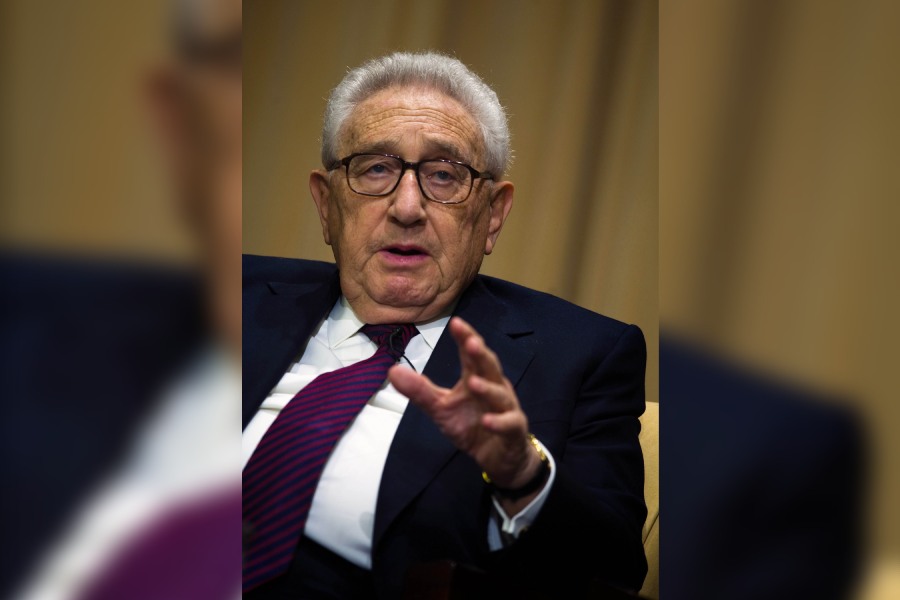Henry A. Kissinger, the scholar-turned-diplomat who engineered the United States’ opening to China, negotiated its exit from Vietnam, and used cunning, ambition and intellect to remake American power relationships with the Soviet Union at the height of the Cold War, sometimes trampling on democratic values to do so, died on Wednesday at his home in Kent, Connecticut. He was 100.
His death was announced in a statement by his consulting firm.
Henry A. Kissinger, the scholar-turned-diplomat who engineered the United States’ opening to China, negotiated its exit from Vietnam, and used cunning, ambition and intellect to remake American power relationships with the Soviet Union at the height of the Cold War, sometimes trampling on democratic values to do so, died on Wednesday at his home in Kent, Connecticut. He was 100.
His death was announced in a statement by his consulting firm.
ADVERTISEMENT
Few diplomats have been both celebrated and reviled with such passion as Kissinger. Considered the most powerful secretary of state in the post-World War II era, he was by turns hailed as an ultrarealist who reshaped diplomacy to reflect U.S. interests and denounced as having abandoned American values, particularly in the arena of human rights, if he thought it served the nation’s purposes.
He advised 12 presidents — more than a quarter of those who have held the office — from John F. Kennedy to Joe Biden With a scholar’s understanding of diplomatic history, a German-Jewish refugee’s drive to succeed in his adopted land, a deep well of insecurity and a lifelong Bavarian accent that sometimes added an indecipherable element to his pronouncements, he transformed almost every global relationship he touched.
At a critical moment in U.S. history and diplomacy, he was second in power only to President Richard Nixon. He joined the Nixon White House in January 1969 as national security adviser and, after his appointment as secretary of state in 1973, kept both titles, a rarity. When Nixon resigned, he stayed on under President Gerald Ford.
Kissinger’s secret negotiations with what was then still called Red China led to Nixon’s most famous foreign policy accomplishment. Intended as a decisive Cold War move to isolate the Soviet Union, it carved a pathway for the most complex relationship on the globe, between countries that at Kissinger’s death were the world’s largest (the United States) and second-largest economies, completely intertwined and yet constantly at odds as a new Cold War loomed.
For decades he remained the country’s most important voice on managing China’s rise, and the economic, military and technological challenges it posed. He was the only American to deal with every Chinese leader from Mao Zedong to Xi Jinping. In July, at age 100, he met Xi and other Chinese leaders in Beijing, where he was treated like visiting royalty even as relations with Washington had turned adversarial.
He drew the Soviet Union into a dialogue that became known as detente, leading to the first major nuclear arms control treaties between the two nations. With his shuttle diplomacy, he edged Moscow out of its standing as a major power in the Middle East, but failed to broker a broader peace in that region.
Over years of meetings in Paris, he negotiated the peace accords that ended the U.S. involvement in the Vietnam War, an achievement for which he shared the 1973 Nobel Peace Prize. He called it “peace with honor,” but the war proved far from over, and critics argued that he could have made the same deal years earlier, saving thousands of lives.
Within two years, North Vietnam had overrun the American-backed South. It was a humiliating end to a conflict that from the beginning Kissinger had doubted the United States could ever win.
To his detractors, the communist victory was the inevitable conclusion of a cynical policy that had been intended to create some space between the American withdrawal from Vietnam and whatever came next. Indeed, in the margins of the notes for his secret trip to China in 1971, Kissinger scribbled, “We want a decent interval,” suggesting he simply sought to postpone the fall of Saigon.
